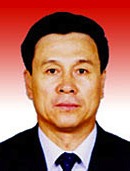Yang Jing 杨晶
Secretary General, State Council
1953
Handles the State Council’s day-to day operations. Formerly responsible for Central Government’s relations with the non-Han Chinese citizens of China. Thought to be the most senior non-Han politician in the PRC

Overview
Pronunciation: Yahng Jing soundbite
Born: 1953
Education: Inner Mongolia University, Department of Chinese.
Career: Served as a Deputy Director of United Front Work Department (UFWD) until 2012. Now a State Councilor, Secretary General of the State Council and on the Central Committee Secretariat.
Prospects: Failed to make the 19th Central Committee.
Relevance to Tibet: Former Minister of State Ethnic Affairs Commission and Deputy Director of United Front Work Department.
Standing in the Party and Career Highlights:
Of Mongolian descent. Various Party positions in Inner Mongolia until 2008, including Director, Tourism Bureau; Communist Youth League positions; Chairman, Inner Mongolia Autonomous Region People’s Government and simultaneously Deputy Party Secretary.
Deputy Director, United Front Work Department (UFWD) 2007 – 2012 and concurrently Minister of State Ethnic Affairs Commission (SEAC) 2008 – 2013. Member of 18th Central Committee and joined Central Committee Secretariat in 2012. However, Yang failed to be appointed to the 19th Central Committee, implying his career is now over.
In 2006 had the “unusually tough” (Xinhua) punishment of having to write a self-criticism for allowing construction of a power station against regulations.
Quotations By/Comments About:
- Yang Jing writing in Beijing Review, October 2009: “Regional autonomy for ethnic minorities fully guarantees people of various ethnic origins in autonomous areas to exercise their democratic rights to manage internal affairs of their own ethnic groups… Sixty years of practice has proven that China’s ethnic policies are correct and successful. Regional autonomy for ethnic minorities is in keeping with China’s actual conditions and the common interests of all ethnic groups. That is why China can maintain ethnic unity and a stable and harmonious society while achieving high-speed growth.”
- China Daily, September 2009: “The ethnic minorities … are among the most benefited groups since the founding of new China…Most ethnic regions of China are rich in natural resources. They have the potential to develop faster than the eastern areas of China if there is a stable environment…. Ethnic people knowing both their own language and Mandarin have more advantages in competition, thus reaching to a wider field to fulfill their goals.”
- Press Conference, September 2009: “Equality, unity, mutual assistance, harmony and common prosperity – these are the basic principles underlining China’s ethnic policies. Among these elements, equality is the cornerstone, unity the theme, mutual assistance the guarantee and harmony the essence while common prosperity represents the objective.”
- April 2008: “Tibet’s old feudal serfdom system fundamentally robbed Tibetans of their human rights and prevented economic and social progress.”
- Cheng Li, Brookings, 2008: [Yang is the only State Council minister from a minority group. First choice was Yang Chuantang, former Party secretary in Tibet but the leadership then decided that it would be politically incorrect to have a Han as Minister of Ethnic Affairs.] Chinese leaders have “recognized the value of having ethnic minority cadres serve in the Party-state elite, both for propaganda purposes as well as to inspire minority peoples to view the system as containing opportunities for their own advancement and therefore work within the system rather than against it. Those ethnic minority elites who have been appointed by the CCP Organization Department have usually gone through a great deal of scrutiny to make sure that they are loyal to the Communist regime and will obediently carry out the orders of the Party’s national leadership.”
Yang Jing’s Contact Information:
- Address: State Ethnic Affairs Commission, No.252 Taipingqiao Dajie, Xicheng District, Beijing 100800
- Website: www.seac.gov.cn/lsnsjg/bgt/R01index_1.htm
- Phone: + 86 10 6650 8000
- Fax: + 86 10 6601 7375
Printing this Page
For best results when printing this page, adjust your print settings by unchecking “print background colours” and “print background images”.
